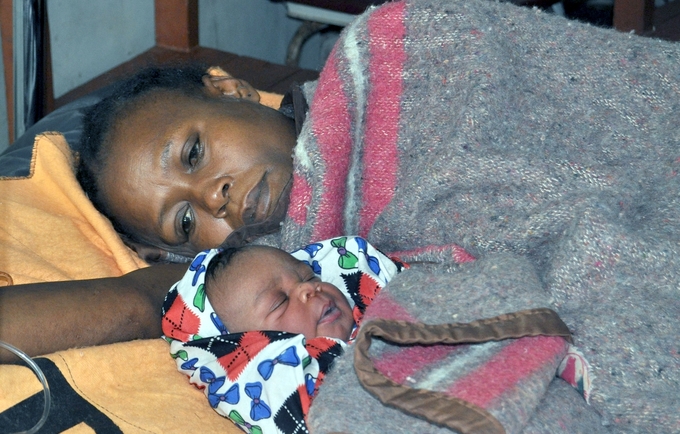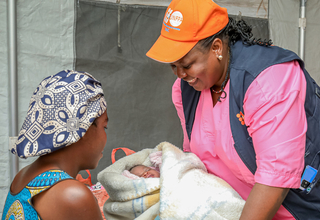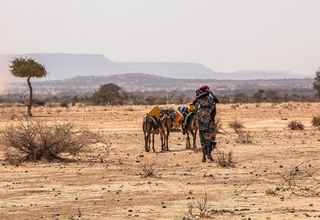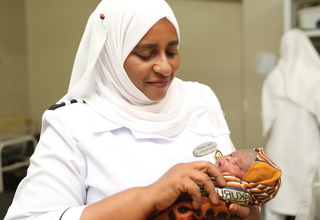ADDIS ABABA, Ethiopia – She dreamt of becoming a midwife from the age of 12, when her mother almost bled to death while giving birth to her tenth child. A medical professional dressed in a white gown was sent for from a local health institution and managed to save her mother’s life.
Sister Yewobdar Lisanework is still tearful when she recalls the incident. “I prayed to God then and there to give me a profession which would save mothers’ lives, and God granted me my wish,” she says.
I prayed to God then and there to give me a profession which would save mothers’ lives, and God granted me my wish.
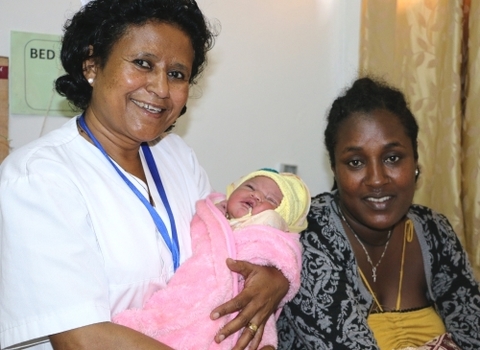
It led her on a path to a profession she has served with devotion for 32 years – and for which she received international recognition last year.
Mommy – as her colleagues fondly call her – began preparing to celebrate the silver jubilee of her employment at Nefas Silk Lafto Woreda 3 Health Centre, two months in advance. She had no idea of the surprise that was in store for her on that day, May 13, on which the International Day of the Midwife (IDM) was also to be commemorated nationally.
Sr. Yewoubdar was presented with a Midwives 4 All Award by Jan Sadek, Ambassador of Sweden to Ethiopia, on behalf of the Swedish Ministry of Foreign Affairs, for excellence in midwifery and her contribution to maternal and newborn health.
Midwives are the unsung heroes
I just strived to save the lives of mothers and newborns. This is an award for all midwives in Ethiopia, who have been the unsung heroes for long.
“I didn’t work for the award,” she says. “I just strived to save the lives of mothers and newborns. This is an award for all midwives in Ethiopia, who have been the unsung heroes for long.” Midwifery is more than a profession for her; it is a cause to which she has dedicated her life. “I believe that midwifery runs in my veins,” she says.
Formal midwifery training began in Ethiopia in the 1950s but progress made in producing these professionals has been very sluggish. Sixty years on, the country had fewer than 2000 midwives for a population of more than 70 million people.
This has meant that midwives like Sr. Yewoubdar bear a disproportionate share of the task of saving the lives of mothers and newborns. She remembers attending to as many as nine deliveries one particular night – on her own.
The Ministry of Health’s 20-year Human Resources for Health Strategy provides for the training and deployment of close to 10,000 midwives to health centres across the country by 2020.
Around 4500 of these midwives have been trained through the Accelerated Midwifery Programme, which began in 2011 and was implemented over three years. This involved the training of clinical nurses in a one-year diploma in midwifery, which UNFPA supported financially and technically, with funding secured from the Swedish International Development Agency.
Under the Investing in Midwives Programme, Sr. Yewobdar was designated an ambassador by the Minister of Health to promote the initiative to increase the number of midwives. The central focus was to accelerate the reduction of maternal and neonatal morbidity and mortality. Health centres around the country where midwives were trained under the Accelerated Midwifery Programme have shown a 61 per cent increase in institutional delivery.
Midwives reduce maternal deaths in Ethiopia
This investment has contributed to the commendable progress Ethiopia has made in recent years in reducing maternal mortality. A report by the UN Inter-Agency Group in 2013 estimated that the maternal mortality ratio declined from 1400 deaths per 100,000 live births to 353 per 100,000 between 1990 and 2015 – with the absolute number of women who died during pregnancy or childbirth decreasing by nearly 69 per cent.
I have no words to express the joy that I feel when I conduct a safe delivery and place a newborn into the embraces of the mother.
Sr. Yewobdar hardly looks her 53 years. “I have no words to express the joy that I feel when I conduct a safe delivery and place a newborn into the embraces of the mother. It is this joy and satisfaction that keeps me going, which no amount of money can buy,” she says.
It is incredible to think that on her watch, the life of a mother or neonate has never been lost. Her personal experiences have played a part in this success. “I always think of my mother when I conduct the deliveries and take extra precautions to ensure that no mother or her newborn is at risk,” she says.
Sr. Yewobdar is doing all she can to motivate other midwives to be as passionate about their profession. With the support of management at the health centre where she works, she has set up a clinical skills lab to build the practical skills of midwives.
The global prize she received from the Swedish Government adds to the growing number of awards in recognition of her excellence in service to mothers and newborns.
By Abraham Gelaw
